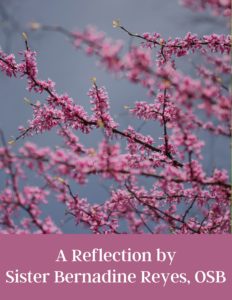Reflecting During the Lenten Season by Sr. Bernadine Reyes, OSB, Prioress

We are now in the Lenten Season, an opportune time for reflection on who we are before God and one another. I was drawn to reflect on the Gospel for the fifth Sunday of Lent, John 11:1-45. This gospel is relating the story of the two sisters, Martha and Mary, anxious to have Jesus come and cure their brother, Lazarus, of his illness. Jesus delays, and in the meantime, Lazarus dies and is buried in a tomb. Jesus arrives, weeps, and calls Lazarus forth and he comes.
Each time I read this gospel, I am drawn to the part of the story where Jesus calls Lazarus forth from the tomb. Lazarus hears the call and stumbles out since he is still bound. Jesus does not untie him but rather calls others to untie him and to let him go.
The questions that surface for me are, “When have I been in a tomb?” Was I able to believe that Jesus wept for me as he did for Lazarus and that it was he who called me out of my tomb? Was I able hear the call to “come out” and who were the ones who unbound me? And the larger question is, who else in our neighborhoods, church communities, workplaces, schools, is bound and living in their own tombs?
In the February 19th Sunday Express News, there was an investigative story that shed some light about the troubled 18-year-old who committed the horrific crime of killing 19 children and two adults in Uvalde, TX last May. The article related that he struggled academically. He dropped out of school at the age of 17, having completed only the ninth grade. His family reported that he was bullied because of his stutter, and because of the speech impediment, was a loner. Records show that he had more than one hundred absences annually since 2018.
The tomb for this young man was vast and deep. Was he able to hear Jesus’ call to “come out” and did he have around him those who could have “untied him and let him go”?
May our Lenten Season challenge us to reflect on those times when we have been in “tombs” of our own making, or otherwise. May we be grateful for those who “untie us”, and, even more, may we recognize others “in tombs” and reach out to “untie” them into greater freedom.
